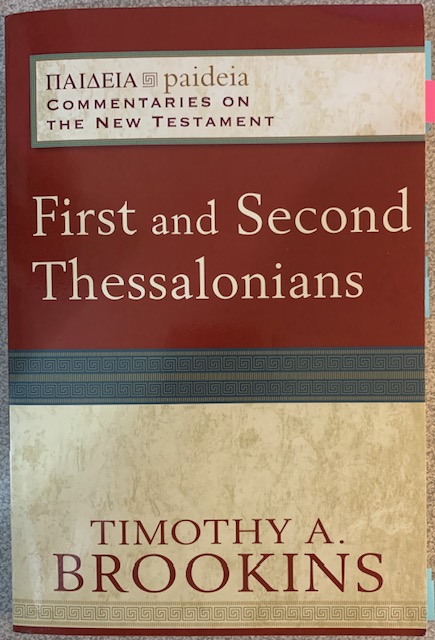Book Review: First and Second Thessalonians, by Timothy A. Brookins
June 6, 2024 5 Comments
Paideia: Commentaries on the New Testament, Mikeal C. Parsons, Charles H. Talbert, Bruce W. Longenecker, series Gen. Eds. (Grand Rapids, MI: Baker Academic, 2021), 256 pages.
 Until just recently, this commentary series has eluded me. The Paideia (“education”) series’ threefold aim is based on its name: (a) to guide students’ engagement with the final form of the New Testament text, (b) to situate the Biblical book within its ancient writer’s and readers’ literary and cultural milieu, and (c) to explain the instructional intents of the Biblical writers as forming “theological convictions and moral habits” (p ix).
Until just recently, this commentary series has eluded me. The Paideia (“education”) series’ threefold aim is based on its name: (a) to guide students’ engagement with the final form of the New Testament text, (b) to situate the Biblical book within its ancient writer’s and readers’ literary and cultural milieu, and (c) to explain the instructional intents of the Biblical writers as forming “theological convictions and moral habits” (p ix).
Its intended readership is students “who have theological interests in the biblical texts” (p ix). While, of course, this includes seminary students, certainly motivated laypersons would benefit. The authors of the series come from varying backgrounds: Protestant, Catholic, and Orthodox. While some might initially be put off by this, the unifying aspect is all “share…a commitment to reading the biblical text as theological documents within their ancient contexts” (p x). A reader can surely filter out any confessional or denominational slant that may present itself.
Timothy A. Brookins (Baylor) “is associate professor of classics and biblical languages at Houston Baptist University” (back cover). Not surprisingly, then, the author sometimes engages the Greek text (transliterated), but mostly via the English translation of it. So, non-specialists should be able to understand the arguments, even the more technical ones, with minimal effort. Overall, Brookins’ writing is lucid and his style readable, making it somewhat easy to take in the points he makes.
After quickly presenting preliminary data (reception and text history; author, date, and provenance) on each epistle individually, Brookins identifies the genre and style. The first is paraenetic (exhortative), while the second is both paraenetic and censorious. Intensely persecuted, the Thessalonian assembly was in need of empathy and encouragement. And Paul (assumed to be author of both letters) delivers in a very pastoral manner. In the second epistle Paul must readdress some misunderstandings as well as handle a new disruptive practice, both of which likely accounts for its relative brevity and “slightly sharper edge” (p 150).
I was delighted by Brookins’ handling of the Dispensationalist pretribulation rapture doctrine (1 Thess 4:17). He concisely explains it in a text box (p 103). In the commentary section he states forthrightly, “There is no evidence in the text that ‘snatching’ [harpazein] implies deliverance from a coming tribulation” (p 103). Amen to that! Implied in this statement is that those using this verse to support ‘the rapture’ are imposing this nineteenth century (not known earlier) doctrine upon the text.
The author adds some fresh insights to these somewhat overlooked epistles. An example is his explanation of “fitting thanks” (pp 157–158). Brookins also notes (p 9) that in 1st Thessalonians there are 19 imperatives and 12 subjunctives in chapters 4 and 5, while only one subjunctive in the first 3 chapters (a purpose clause in 2:16). He sees this as reinforcing an observation in an earlier (1987) work by Abraham Malherbe (who authored the Anchor volume): After building rapport with his readers in the earlier chapters, Paul has prepared the Thessalonians to receive his directives/exhortations in the later chapters.
I highly recommend this book. Brookins’ expertise as a classics prof is amply evidenced. His explanations of the historical background bring the text to life. His writing is engaging.
For the serious student searching for works on the Thessalonian letters, this book should be among the first read. The busy pastor looking for sermon prep on anything inside these two epistles of Paul would find this beneficial, also.
is this the first time you used a commentary from this series? Haven’t read any volume from this set yet
LikeLiked by 1 person
Yes, this is the first one. I was looking for commentaries on the Thessalonian epistles, and I decided to try this one. Glad I did.
LikeLiked by 1 person
how do you enjoy this commentaries format?
LikeLiked by 1 person
I nearly included that info in this review. There are some text boxes, tables, and figures throughout, which breaks up the text. The text itself–the commentary–is broken up into logical chunks, as per an outline. Very easy on the eyes.
LikeLiked by 1 person
Awesome
LikeLiked by 1 person